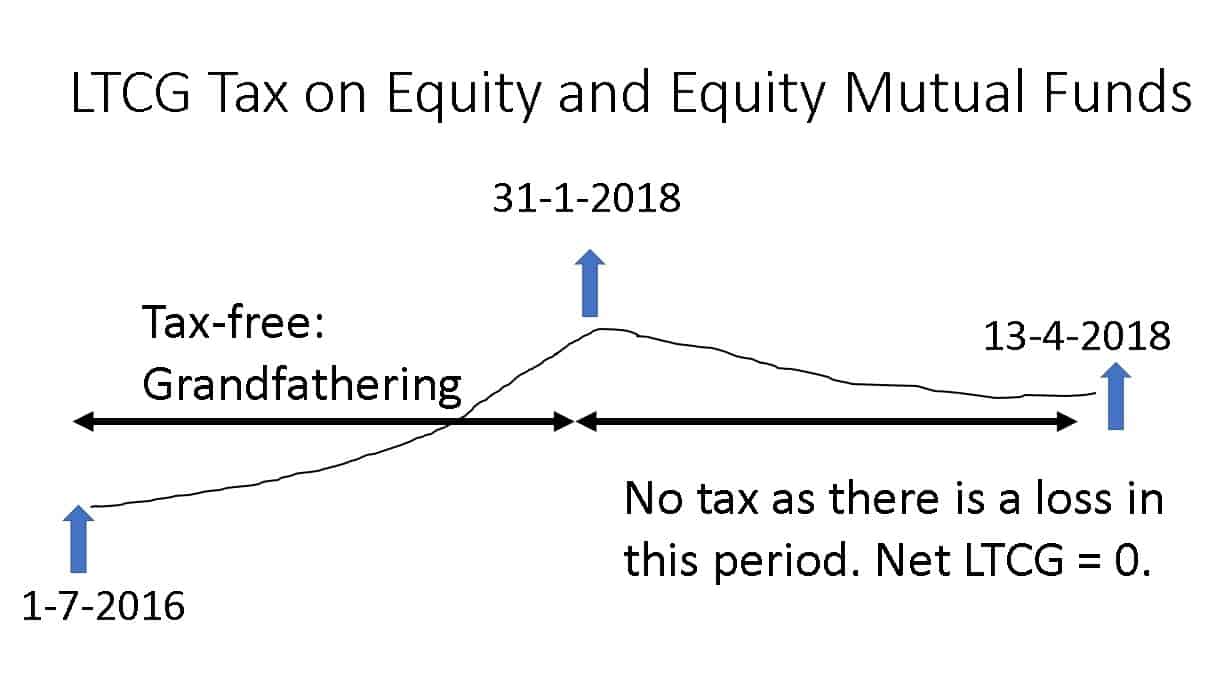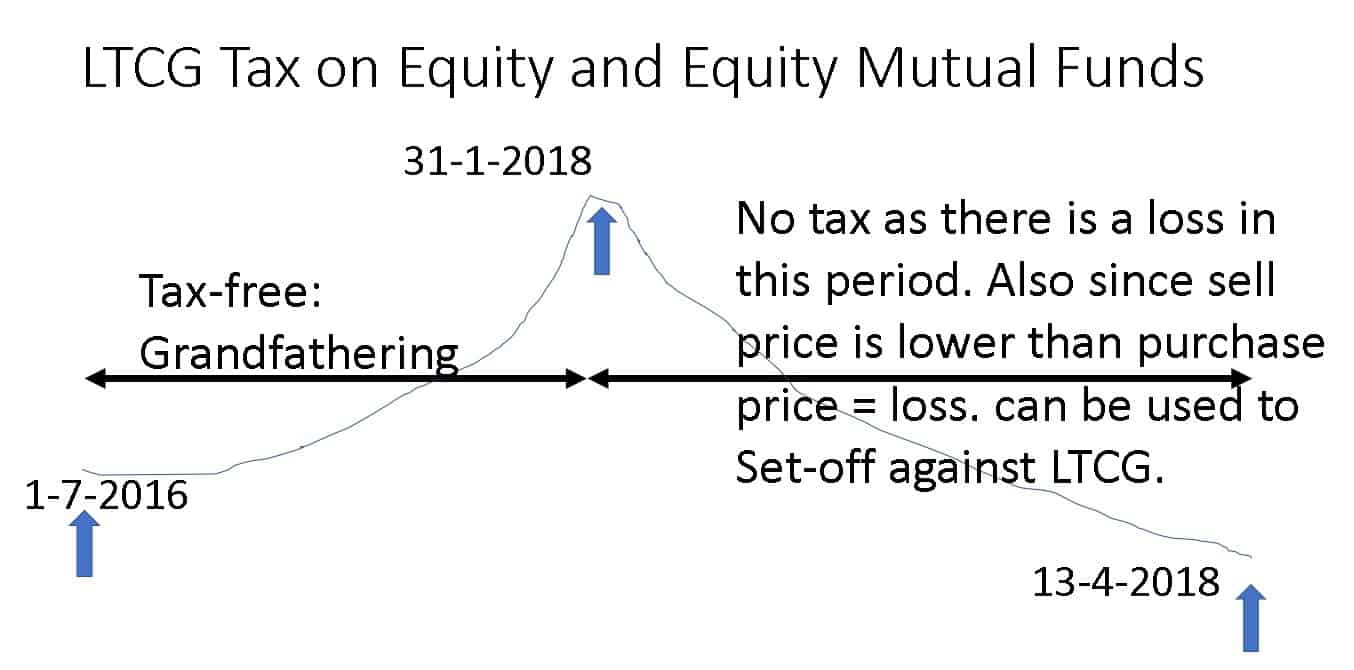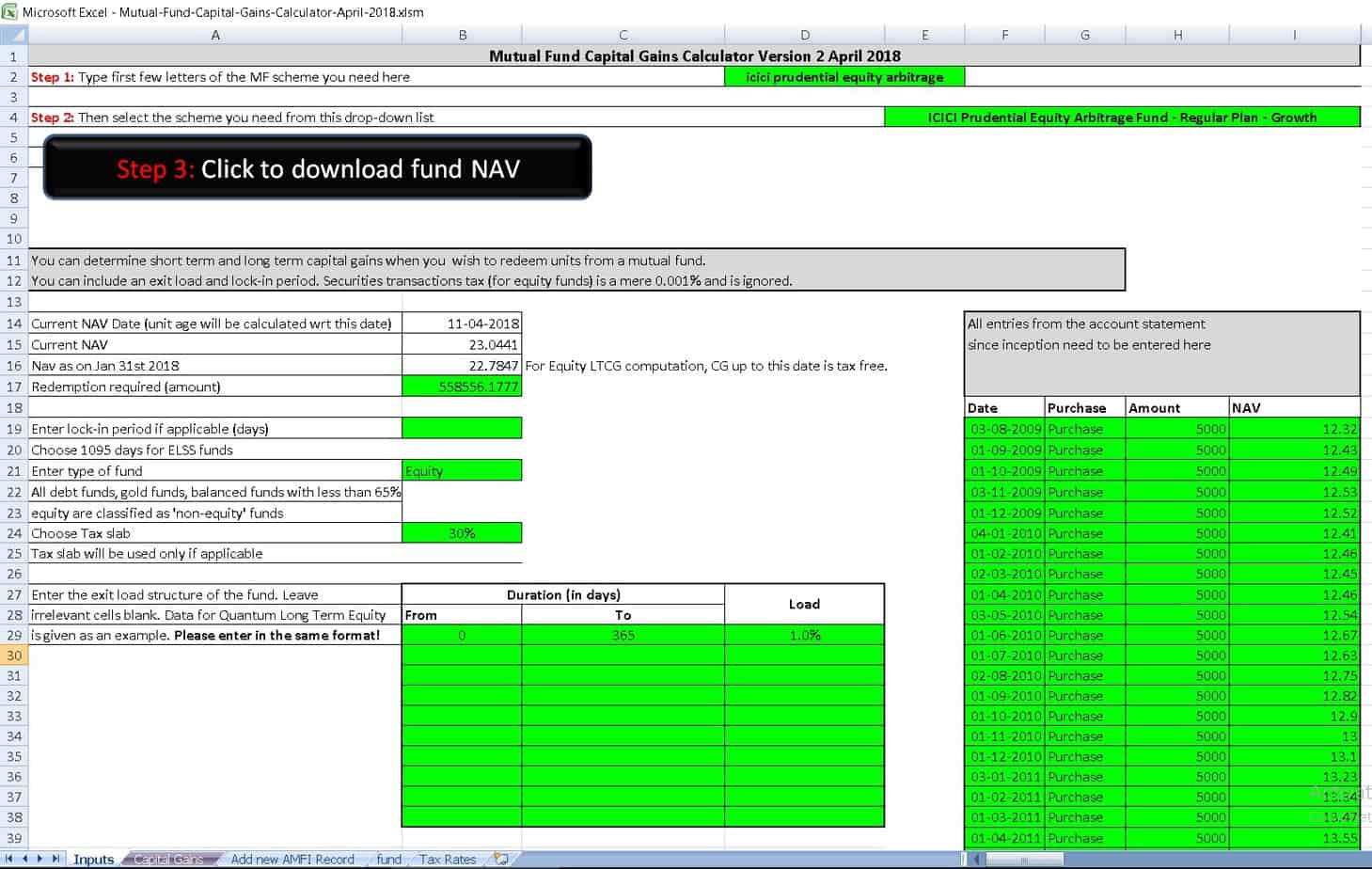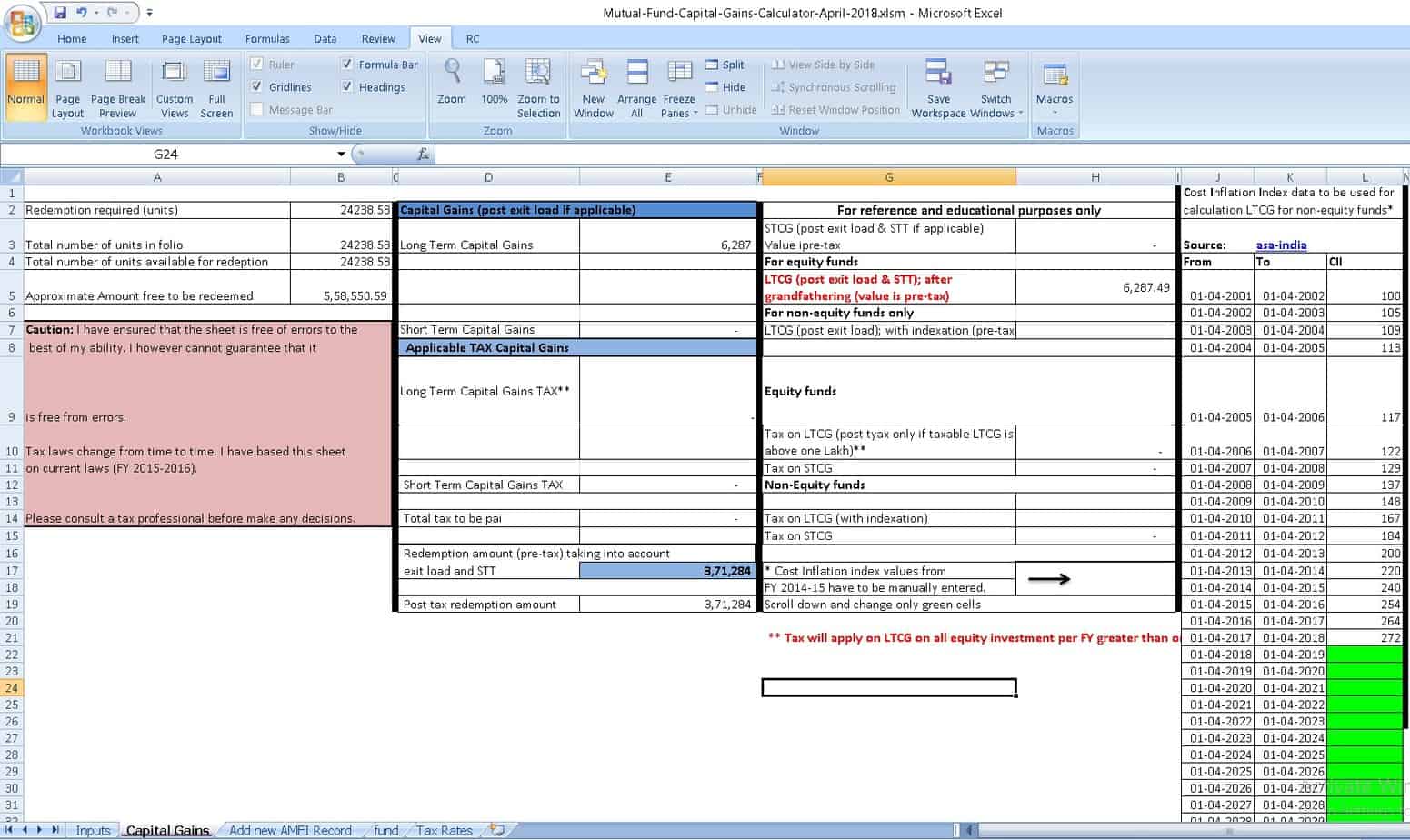Last Updated on December 28, 2021 at 6:38 pm
Here is a simple way to understand how grandfathering works when calculating LTCG tax on equity instruments. Download a free equity LTCG tax calculator to estimate the tax to be paid before you withdraw from an equity mutual fund, You can also use it to calculate STCG, and it will work with debt mutual funds also. The calculator presented here is an update to the Mutual Fund Capital Gains Calculator. The main advantage of this calculator is that you can estimate LTCG or STCG tax to be paid before you make a withdrawal.
Let us now discuss Equity LTCG Tax with grandfathering with a video. The idea is to understand the concept of grandfathering without any math in a visual way so that we can sell at appropriate times to reduce tax. For example, if you wish to switch from regular funds to direct funds, now would be a perfect time to do so. Why? Because the current NAV of almost all equity funds (except arbitrage funds) would be lower than the NAV on Jan 31st 2018. So if you sell or switch, you will not have to pay LTCG tax.
Equity LTCG Tax With Grandfathering Explained: Video
Here are three examples discussed in the video. More examples can be found: Long Term Capital Gains Taxation from Equity: Examples (Budget 2018-2019) and Equity LTCG Taxation: How much tax do I need to pay? Illustration part 1
Equity LTCG Tax when NAV on sell-date is higher than NAV on Jan 31st, 2018
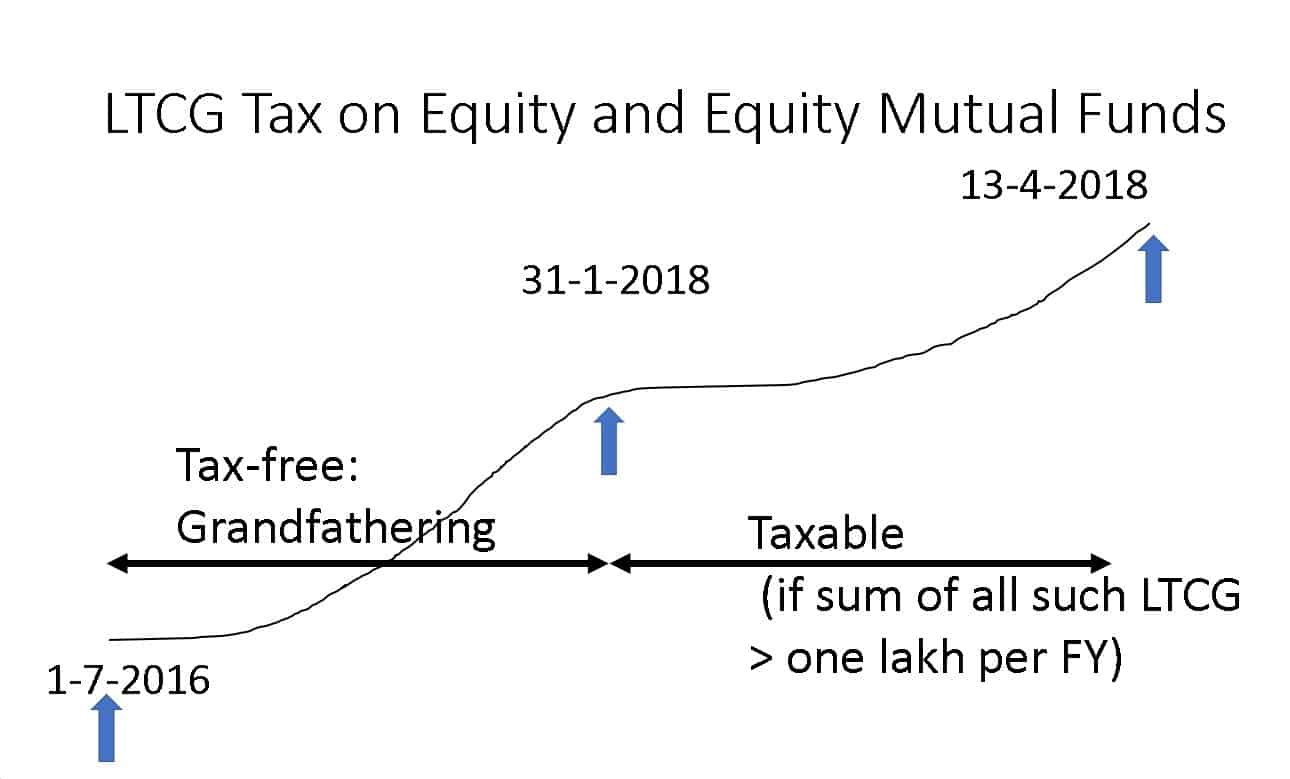 Note that you will have to pay tax only if the sum of all such taxable LTCG (as shown above) across all your equity investments is above Rs. 1 Lakh in a particular financial year. If it is above Rs. one lakh, you will have to pat 10% tax with 4% cess on the amount exceeding one lakh. So for the next few years, the taxation amount will be pretty low for most of us. If you wish to see a detailed example see: Generating tax free income from arbitrage mutual funds
Note that you will have to pay tax only if the sum of all such taxable LTCG (as shown above) across all your equity investments is above Rs. 1 Lakh in a particular financial year. If it is above Rs. one lakh, you will have to pat 10% tax with 4% cess on the amount exceeding one lakh. So for the next few years, the taxation amount will be pretty low for most of us. If you wish to see a detailed example see: Generating tax free income from arbitrage mutual funds
Join 32,000+ readers and get free money management solutions delivered to your inbox! Subscribe to get posts via email! (Link takes you to our email sign-up form)
🔥Want to create a complete financial plan? Learn goal-based investing? Exclusive access to our DIY tools? Increase your income with your skills? Enjoy massive discounts on our robo-advisory tool & courses! 🔥
Equity LTCG Tax when NAV on sell-date is lower than NAV on Jan 31st, 2018
Please note that that effective LTCG in this case =0. There is no loss here.
Equity LTCG Tax when NAV on sell-date is lower than NAV on buy-date
This is an actual loss. The sell-NAV is lower than the purchase-NAV (or stock price). You can use this to reduce LTCG from other instruments (incl equity). If you do not have LTCG then you can report this LTCL and carry it forward for the next 8 financial years and offset it when possible.
Additional resources on Equity LTCG taxation
Equity LTCG Taxation: How much tax do I need to pay? Illustration part 1
Should I book profits each year to lower Equity LTCG Tax?
Equity LTCG Tax With Grandfathering Calculator
Many people find it hard to believe but the above calculations have to be performed for each unit or stock sold. So if you have a SIP running, or multiple investments, then you will have to enter all transactions. There is no other way around! Please check the calculations presented and compare it the AMC CG statement. Consult a CA for clarification. If you notice any issues, let me know. Here are a couple of screenshots.
Download the Equity LTCG Tax With Grandfathering Calculator
Check out more videos from the freefinal youtube channel
🔥Enjoy massive discounts on our courses, robo-advisory tool and exclusive investor circle! 🔥& join our community of 7000+ users!
Use our Robo-advisory Tool for a start-to-finish financial plan! ⇐ More than 2,500 investors and advisors use this!
Track your mutual funds and stock investments with this Google Sheet!
We also publish monthly equity mutual funds, debt and hybrid mutual funds, index funds and ETF screeners and momentum, low-volatility stock screeners.





- Do you have a comment about the above article? Reach out to us on Twitter: @freefincal or @pattufreefincal
- Have a question? Subscribe to our newsletter using the form below.
- Hit 'reply' to any email from us! We do not offer personalized investment advice. We can write a detailed article without mentioning your name if you have a generic question.
Join 32,000+ readers and get free money management solutions delivered to your inbox! Subscribe to get posts via email! (Link takes you to our email sign-up form)
About The Author
 Dr M. Pattabiraman(PhD) is the founder, managing editor and primary author of freefincal. He is an associate professor at the Indian Institute of Technology, Madras. He has over ten years of experience publishing news analysis, research and financial product development. Connect with him via Twitter(X), Linkedin, or YouTube. Pattabiraman has co-authored three print books: (1) You can be rich too with goal-based investing (CNBC TV18) for DIY investors. (2) Gamechanger for young earners. (3) Chinchu Gets a Superpower! for kids. He has also written seven other free e-books on various money management topics. He is a patron and co-founder of “Fee-only India,” an organisation promoting unbiased, commission-free investment advice.
Dr M. Pattabiraman(PhD) is the founder, managing editor and primary author of freefincal. He is an associate professor at the Indian Institute of Technology, Madras. He has over ten years of experience publishing news analysis, research and financial product development. Connect with him via Twitter(X), Linkedin, or YouTube. Pattabiraman has co-authored three print books: (1) You can be rich too with goal-based investing (CNBC TV18) for DIY investors. (2) Gamechanger for young earners. (3) Chinchu Gets a Superpower! for kids. He has also written seven other free e-books on various money management topics. He is a patron and co-founder of “Fee-only India,” an organisation promoting unbiased, commission-free investment advice.Our flagship course! Learn to manage your portfolio like a pro to achieve your goals regardless of market conditions! ⇐ More than 3,000 investors and advisors are part of our exclusive community! Get clarity on how to plan for your goals and achieve the necessary corpus no matter the market condition is!! Watch the first lecture for free! One-time payment! No recurring fees! Life-long access to videos! Reduce fear, uncertainty and doubt while investing! Learn how to plan for your goals before and after retirement with confidence.
Our new course! Increase your income by getting people to pay for your skills! ⇐ More than 700 salaried employees, entrepreneurs and financial advisors are part of our exclusive community! Learn how to get people to pay for your skills! Whether you are a professional or small business owner who wants more clients via online visibility or a salaried person wanting a side income or passive income, we will show you how to achieve this by showcasing your skills and building a community that trusts and pays you! (watch 1st lecture for free). One-time payment! No recurring fees! Life-long access to videos!
Our new book for kids: “Chinchu Gets a Superpower!” is now available!


Must-read book even for adults! This is something that every parent should teach their kids right from their young age. The importance of money management and decision making based on their wants and needs. Very nicely written in simple terms. - Arun.Buy the book: Chinchu gets a superpower for your child!
How to profit from content writing: Our new ebook is for those interested in getting side income via content writing. It is available at a 50% discount for Rs. 500 only!
Do you want to check if the market is overvalued or undervalued? Use our market valuation tool (it will work with any index!), or get the Tactical Buy/Sell timing tool!
We publish monthly mutual fund screeners and momentum, low-volatility stock screeners.
About freefincal & its content policy. Freefincal is a News Media Organization dedicated to providing original analysis, reports, reviews and insights on mutual funds, stocks, investing, retirement and personal finance developments. We do so without conflict of interest and bias. Follow us on Google News. Freefincal serves more than three million readers a year (5 million page views) with articles based only on factual information and detailed analysis by its authors. All statements made will be verified with credible and knowledgeable sources before publication. Freefincal does not publish paid articles, promotions, PR, satire or opinions without data. All opinions will be inferences backed by verifiable, reproducible evidence/data. Contact information: To get in touch, use this contact form. (Sponsored posts or paid collaborations will not be entertained.)
Connect with us on social media
- Twitter @freefincal
- Subscribe to our YouTube Videos
- Posts feed via Feedburner.
Our publications
You Can Be Rich Too with Goal-Based Investing
 Published by CNBC TV18, this book is meant to help you ask the right questions and seek the correct answers, and since it comes with nine online calculators, you can also create custom solutions for your lifestyle! Get it now.
Published by CNBC TV18, this book is meant to help you ask the right questions and seek the correct answers, and since it comes with nine online calculators, you can also create custom solutions for your lifestyle! Get it now.Gamechanger: Forget Startups, Join Corporate & Still Live the Rich Life You Want
 This book is meant for young earners to get their basics right from day one! It will also help you travel to exotic places at a low cost! Get it or gift it to a young earner.
This book is meant for young earners to get their basics right from day one! It will also help you travel to exotic places at a low cost! Get it or gift it to a young earner.Your Ultimate Guide to Travel
 This is an in-depth dive into vacation planning, finding cheap flights, budget accommodation, what to do when travelling, and how travelling slowly is better financially and psychologically, with links to the web pages and hand-holding at every step. Get the pdf for Rs 300 (instant download)
This is an in-depth dive into vacation planning, finding cheap flights, budget accommodation, what to do when travelling, and how travelling slowly is better financially and psychologically, with links to the web pages and hand-holding at every step. Get the pdf for Rs 300 (instant download)